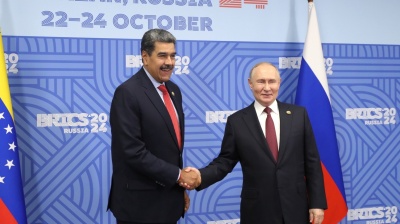Colombia will formally join China's Belt and Road Initiative (BRI), President Gustavo Petro Urrego announced during his visit to the Great Wall on May 12. Petro stated the country would "sign the Silk Road," referencing the historic trade routes that inspired China's global infrastructure programme, Reuters reported.
The South American nation, which has seen bilateral trade with China grow to approximately COP73.5 trillion ($20bn) annually according to Trading Economics, appears to be diversifying its economic partnerships beyond traditional allies, just as the US pulls away from international commitments and becomes more isolationist under President Donald Trump. Petro explicitly mentioned leveraging potential BRI funding for artificial intelligence development and youth employment initiatives, signalling a technology-focused approach to the partnership.
Colombia would become the latest Latin American country to embrace Beijing's signature development framework, joining regional neighbours including Chile, Peru and Venezuela, which have previously signed BRI cooperation agreements. The move is yet another signal of growing Chinese influence in a region traditionally considered within the US sphere of influence.
"This represents a significant shift in Colombia's international economic strategy," says Ricardo Ávila, senior analyst at Portafolio, noting that Chinese infrastructure investment across Latin America has already exceeded COP147 trillion ($40bn) since the BRI's inception. The programme typically provides financing for major infrastructure projects, often constructed by Chinese companies.
For Colombia, whose infrastructure quality ranks 83rd globally according to the World Economic Forum, potential BRI investments could help address critical gaps in transportation networks and digital connectivity. The country faces an estimated COP110 trillion ($26.6bn) infrastructure deficit, particularly in rural regions where development has lagged.
However, financial experts caution about potential debt implications. Analysts warn that Chinese infrastructure financing often comes with less stringent governance requirements than Western alternatives, but can create substantial sovereign obligations. Several Latin American nations have experienced debt sustainability challenges following major Chinese-funded projects.
The announcement has sparked mixed reactions within Colombia's political landscape. Lawmakers from opposition parties, including members of the Centro Democrático, have criticised the move as a potential risk to national sovereignty and questioned the transparency of future BRI-funded projects.
Conversely, figures within Petro’s Pacto Histórico leftist coalition have hailed the decision as a pragmatic step toward diversifying Colombia’s global alliances and securing funding for underdeveloped regions. Analysts note that while the executive branch can sign international cooperation agreements, congressional approval may still be required for binding financial commitments tied to the BRI framework. Colombia's move follows similar agreements by regional neighbours, whose experiences offer a mixed picture.
In Peru, for instance, Chinese firms have heavily invested in mining and port infrastructure, contributing to economic growth but also drawing criticism over environmental concerns and labour practices. Chile has benefited from enhanced agricultural exports and digital cooperation, particularly in 5G network infrastructure, although tensions have emerged over data security concerns.
Meanwhile, Venezuela's reliance on Chinese financing has raised alarms, with opaque loan terms and stalled projects contributing to fiscal instability. These precedents suggest that while BRI participation can unlock significant investment, outcomes depend heavily on domestic governance and project oversight. Even after restructuring its debt in 2022, Ecuador remains on the hook for nearly $3bn to China.
Before Colombia formally enters the Belt and Road Initiative, a series of complex negotiations are expected to take place, according to Daniela Rueda, an analyst at Colombia Risk Analysis, who spoke to Entorno.
She warned that poor handling by the Colombian government could have severe repercussions, potentially tipping the country into a precarious debt position.
“As with any international integration effort, there are clear opportunities—but also substantial risks,” Rueda noted. “For Colombia, the prospect of increased indebtedness stands out as a critical issue requiring prudent consideration,” Rueda said.
The geopolitical dimensions of Colombia's decision cannot be overlooked. With US-Colombia trade reaching approximately COP140 trillion ($38bn) annually, Washington has traditionally been Bogotá's principal economic partner. But the relationship has soured with the return of Trump to the White House, as the new US administration pursues aggressive trade policies and ratchets up rhetoric against Latin American nations, accused of not doing enough to stem the flow of illegal migrants heading north. The US Embassy in Bogotá has not yet commented on Petro's announcement.
China's expanding economic footprint in Latin America includes substantial investments in energy, mining and infrastructure sectors. The BRI has evolved since its 2013 launch, increasingly incorporating digital infrastructure and technology transfer alongside traditional physical infrastructure projects.
The Petro administration has consistently sought to balance Colombia's international relationships while addressing domestic economic challenges, including a sluggish growth rate that slowed to 1.9% in 2024. Whether BRI participation will deliver the employment and technology transfer benefits Petro envisions remains to be seen, as outcomes have varied significantly across participating nations.
While specific projects and investment figures have not yet been announced, the formal signing would mark a milestone in Colombia-China relations and potentially reshape regional economic dynamics for years to come.
News

Ukraine’s elite HUR forces turn the tide in the battle for Pokrovsk, as Russia’s effort to capture key logistics hub fails
The battle for Pokrovsk became intense early on November 1and it looked like the fall of the key logistics hub to Russia was imminent. But a bold counterattack by Ukraine’s elite HUR forces seems to have turned the tide.

US prepares attack on Venezuela as Maduro begs Putin for aid
The Trump administration has reportedly drawn up a list of potential military targets within Venezuela as part of its intensifying pressure on President Nicolás Maduro, who has turned to Moscow seeking urgent military assistance.

Bulgaria suspends fuel exports to EU after US sanctions Lukoil
Bulgaria has temporarily suspended exports of petroleum products to European Union countries after the United States imposed sanctions on Russian oil giant Lukoil.

Tens of thousands rally in Serbia's Novi Sad one year after deadly station collapse
Tragedy that killed 16 people has become a symbol of public anger over corruption and negligence, fueling Serbia’s largest protest movement in more than a decade.



